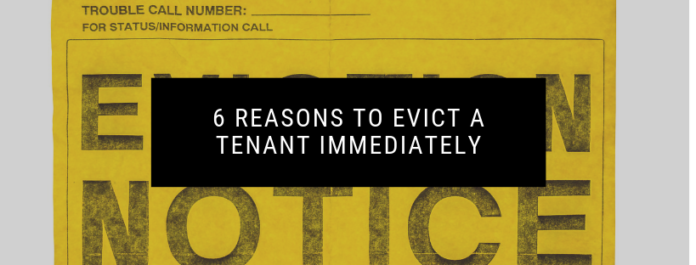According to NPR, there were an estimated 2.3 million U.S. evictions filed in a single year.
Not everyone turns out to be a dream tenant. In some cases, renters can make so much trouble that you have no choice to evict them.
Chances are, there’s a better renter out there (one who likely pays on time).
Evicting a renter might feel like a difficult, unnerving task. You should know there’s a right and wrong way to go about it. Proper research and preparation can make it easier to put your rental property back on the market.
Keep an eye out for these six reasons to evict a tenant. Using these reasons for eviction, you can ensure the eviction process is done correctly—and legally.
Here are grounds for eviction you can use to remove a less-than-ideal tenant.
1. They Aren’t Paying
In 2015, more than 20 million renters (half of all renters in the U.S.) were cost-burdened. That means these renters spent at least 30 percent of the income on rent.
Ideally, your tenants should pay their rent on time, every month, in full.
Unfortunately, it doesn’t always work out that way.
Landlords can evict their tenants for neglecting to pay their rent in most states. Constantly late payments are grounds for eviction, too.
However, the exact terms of this issue vary from state to state.
For example, how many days the rent can be submitted late depends on the location. Don’t forget that eviction is a legal process. That means you need to follow the laws of the state where the property is located.
Notice
Most cases require you to send the tenant a notice of payment. This serves as a warning for the tenant to pay their rent.
The lease agreement should outline a late rent policy. Check the agreement to determine the grace period. That way, you know how long a tenant has before submitting late feeds or rent payments.
This can also list how many times they can pay their rent late before you take legal action.
These documents also allow you to create a paper trail. The landlord should keep track of every payment they receive—and which they don’t.
The notice to pay rent or quit will list the amount your tenant owes. It will also inform the tenant that you will file for eviction if they don’t pay the noted amount.
It’s important to note that there are some cases where a tenant can legally withhold rent. For example, a tenant can refuse to pay rent until a safety or health violation is fixed.
If your tenant isn’t paying, use this guide to learn everything you need to know about evicting them.
2. Lease Violations
You’re also within your rights to evict a tenant if they violate the terms of their lease.
This can include subletting to occupants who aren’t listed on the lease. Your property might also have a no-pets policy.
For many violations, you can give tenants a three to 30-day timeframe to fix the issue. These can include:
- Having pets, or more pets than a tenant is allowed
- Extended guests or unapproved occupants (creating possible legal and liability issues)
- Unapproved subletting (violating exclusive rights to occupy the property)
- Improper use of the property (using it as a home-based business, for example)
- Nuisance complaints (loud parties or behavior that involves the police)
If you decide to give the tenant a second chance after they violate the lease, get it in writing. Have a witness, too.
That way, you have a paper trail in case you need to prove your case in court.
Don’t forget: the rental agreement works both ways. A tenant can choose to take you to court if you don’t hold up your end of the agreement.
You can protect yourself before this happens with an airtight rental agreement. Make sure the document is signed by both parties. You can have an attorney read everything over, too.
That way, you’re in compliance with state laws.
You can then use these reasons to evict a tenant while simultaneously protecting yourself.
If you’re worried about properly evicting someone, we’ve reviewed how long the eviction process can take. That way, you can prepare and make sure you don’t miss a step throughout the process.
3. Property Damage
According to this database, North Charleston, SC had the highest rate of evictions in 2016. The grounds for eviction in these cases ranged from lease violations to payment issues.
Another one of the reasons to evict a tenant is property damage.
Wear and tear are bound to happen over time. Fading paint or a scuff against the wall is normal. Damage that goes beyond regular use, however, is grounds for eviction.
This can include:
- Significant water damage
- Structural damage
- Huge holes in the wall (beyond small nail holes)
- Allowing the property to decline to the point it’s a hazard
Often enough, this damage isn’t intentional. A tenant might try to install skylights only to cause roof and water damage. In another case, a tenant might install a hot tub that unintentionally causes structural issues.
In these cases, the damage is a lack of sense.
You can use your own sense to determine whether or not you want to make a case of eviction.
The tenant might be willing to pay for repairs. They can also choose to make the repairs themselves. In these cases, pursuing eviction might not be worthwhile.
After all, someone who is willing to take responsibility for these damages might be worth keeping.
Complete a walk-through of the property with each tenant. You can also take photos of the property’s condition before they move in.
This documentation can act as proof these severe damages are reasons to evict a tenant.
4. Illegal Activity
Illegal actions and behavior are also reasons to evict a tenant.
If they’re using your property for illegal activity, it’s time to get them out of there. This can include distributing illegal substances out of the property.
They might also operate a business out of the home.
Operating a business from a property could violate the rental agreement. It would also violate the insurance policy and break zoning laws. These are all grounds for eviction.
Again, make sure you give the tenant documented notice. Informing the tenant you’re evicting them due to illegal activity creates the necessary paper trail.
A landlord can recognize criminal or drug-related activity as grounds for eviction with 24-hours’ notice or less. The time frame depends on the state.
5. Lease Expired
The lease is bound to expire naturally within time.
If a tenant sticks around after that expiration date, you have a squatter. You also now have grounds for eviction.
Holdovers are grounds for immediate eviction. A holdover is a tenant who refuses to leave the property even after their lease expires.
However, these situations can get tricky. Some leases switch to a monthly basis when they aren’t renewed. The tenant could even continue to pay on time.
In some cases, you may need to consider using these five other reasons to evict a tenant instead.
Don’t forget that notice! If you don’t want the tenant to occupy the property unit anymore, send a notice to quit. You can list the number of days they have to move out before you file an official eviction.
If the tenant isn’t paying rent after their lease expires, you have the grounds for eviction. Then, you can replace them with a paying renter instead.
6. Disruptions
Chances are your tenants want to live without excessive noise or annoying disturbances. In some cases, these are reasons to evict a tenant from the property.
After all, no one wants to live near someone who disrupts the peace and quiet of the neighborhood.
If you create a notice, make sure it lists the specific nature of the disturbances.
These disturbances can include loud music, rambunctious parties, or too much noise during quiet hours.
Try to resolve any noise complaints from other tenants quickly. That way, your tenants will recognize you took immediate action. They can also act as witnesses if the situation leads to legal action.
Taking action yourself also gives you the opportunity to witness the noise.
Then you can prevent the issue from getting worse on-site. Otherwise, excessive noise could cause other tenants to react with a lawsuit.
6 Reasons to Evict a Tenant Immediately
Unfortunately, not every renter is a dream tenant. If you notice any of these six reasons to evict a tenant, you have legal grounds for eviction.
Then you can file an eviction notice and hope for a better tenant the next time around.
Don’t forget to document everything in writing. This includes submitting a notice to the tenant as a warning of eviction. In some cases, having a witness can help as well.
That way, you have invaluable records you might need if you’re required to appear in court.




















